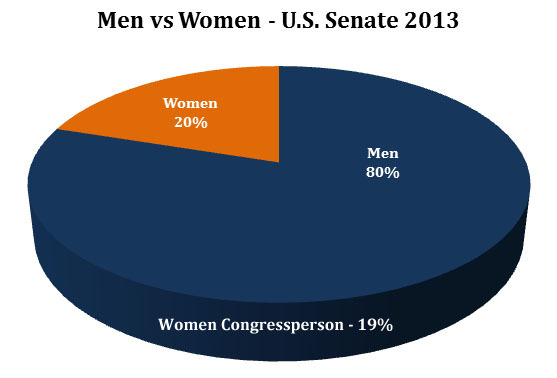There has been a lot of talk about a glass ceiling against women in business and corporate boardrooms. This week's block by the Senate for a bill that would strengthen equal pay for women is a good example of the challenges we face regarding this issue. Moreover, very little has been discussed about women's representation when it comes to making policies and laws. The U.S. Senate, one of the two legislative bodies, is represented by a small elite group of rich old men. Women comprise 20 percent of the Senate and 19 percent of the House of Representatives even though they make up 51 percent of the population. Sadly, the U.S. is ranked 91 in the percentage of women in the national legislatures, according to a report by American University, Men Rule - The Continued Under-Representation of Women in U.S. Politics.
 It is difficult to believe that they will better understand women's issues such as gender pay inequality, domestic violence, sexual harassment, health, aging, education or the pressures of being a single mom--than the women themselves. Furthermore, our senate seems to be a boy's club where male senators treat their female colleagues with sexist remarks as highlighted by the treatment of Senator Kirsten Gillibrand of New York. It seems like our laws are passed by people who do not reflect the make-up of our country.
It is difficult to believe that they will better understand women's issues such as gender pay inequality, domestic violence, sexual harassment, health, aging, education or the pressures of being a single mom--than the women themselves. Furthermore, our senate seems to be a boy's club where male senators treat their female colleagues with sexist remarks as highlighted by the treatment of Senator Kirsten Gillibrand of New York. It seems like our laws are passed by people who do not reflect the make-up of our country.
One outcome of this under-representation of women is our foreign policy of relying on hard power to solve international disputes. As former Secretary of Defense to Presidents Bush and Obama, Robert Gates said that America's most recent presidents "have been too eager to pull a gun to solve a problem." According to a survey of the 43 female politicians around the world by Foreign Policy magazine, "65 percent agreed that: The world would be more peaceful if more women held political office." The author continues "when I ask my peers about this gap, three consensus opinions emerge: 1) Women are more likely to see the other side's point of view, 2) are less likely to see the world as a zero-sum game and 3) are more likely to believe that bombing someone does not ultimately achieve anything." It is hard to imagine that we can win the hearts and minds of people by bombing their countries.
One of the main assets we have in this country is our diversity that is unparalleled anywhere in the world. It is ironic that the world's sole super power and champion of women's rights and democracy is not fully utilizing its assets by not having women as full partners in our public deliberation. In fact, both major parties are stifling competition as reflected by an almost 80 percent incumbency rate in the house and the senate. It is time to think anew, away from a 200 year old two-party model and introduce a third party that reflects mainstream American values and our diversity.

